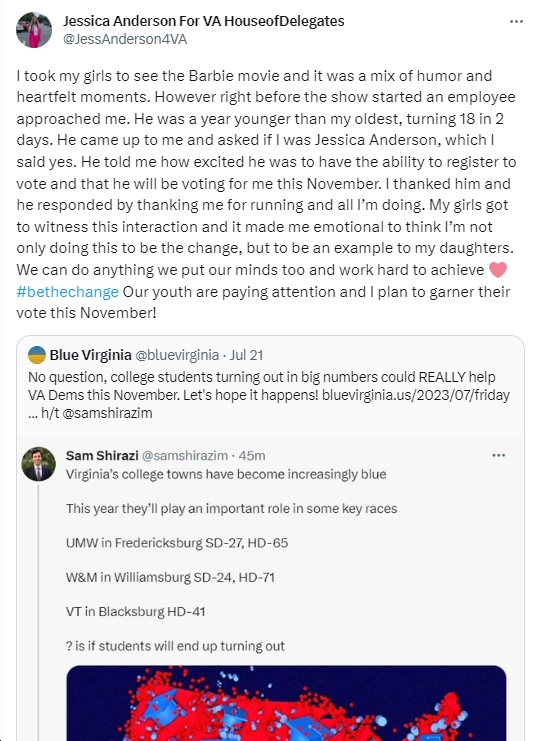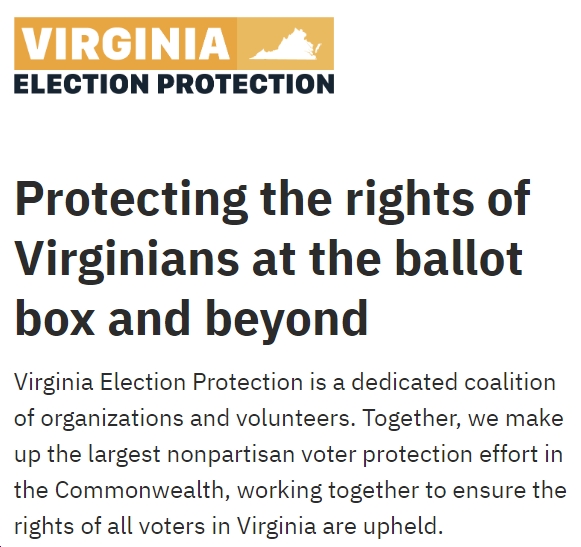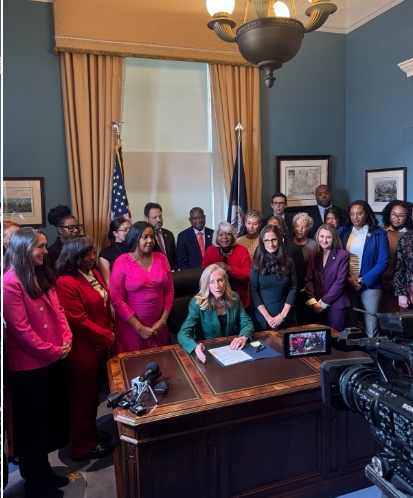With various “bipartisan,” “nonpartisan” and “independent” redistricting plans being bandied about in Virginia right now, who knows what’s going to end up happening. It’s quite possible, for instance, that nothing ends up passing. Or some meaningless, toothless bill…or worse. For instance, see below for an excellent analysis of far-right Republican Delegate Mark Cole’s HJ615 (“Constitutional amendment (first resolution); apportionment; state and local independent redistricting commissions”) by Ben Williams of the Princeton Gerrymandering Project. In short, it’s not a pretty picture, with Williams giving it an “F” and concluding that Virginia’s CURRENT system “is BETTER than this travesty. Vote NO!” (note: bolding added by me for emphasis)
OK I’ve read the amended version of the Cole bill. It has lots of problems, but if House leadership are moving forward on it, it’s a serious piece of policy and deserves scrutiny.
First, the criteria section: HJ615 would require that districts be based on population, comply w/fed. law, respect preexisting political boundaries, be compact, and be contiguous. No mention of communities of interest, no reference to what compactness means. But Section 7 is just bizarre. It would require “parity” between the two largest parties by voteshare in the most recent gubernatorial election. So many problems with this. Why just one election? May not be indicative of statewide performance over a decade. Small sample size.
And what is “parity”? Is it maintaining the same two-party voteshare that they received in that election? Does it mean trying to make the districts evenly balanced, regardless of party preference? The former is bad, but the latter could be mandating partisan gerrymandering. And there’s no prohibition on partisan gerrymandering, no requirement for competitiveness, nothing that would take the politics out of redistricting. A lot of these criteria were also “required” this cycle, and look how that turned out.
Next, the selection process: 4 by the Speaker of the House of Del., 4 by the Senate Committee on Rules (??), and 4 by the Governor. All of these appointees would have to name two Rs and Ds, in theory. But there’s no definition of what D & R is; VA has no party registration… And plus why would anybody trust someone of the opposite party to name their representatives? Why would the House Speaker have any motivation to name someone of the “opposite” party besides either a close personal friend, a RINO/DINO, or someone who flipped parties 3 days prior? Literally no other state does it this way. It’s almost always the majority & minority leaders in each chamber of the legislature picking people to serve on commissions. Easy to envision shenanigans in this selection process w/o any substantive rules.
And no restrictions on who could serve as commissioner. Lobbyists? Legislators themselves? Spouses/kids/donors/known experts in the “dark arts” of gerrymandering? All theoretically possible here. You could fly a 747 through these ethical loopholes.
HJ615 also isn’t an “independent” commission; instead, it’s a line-drawing entity which sends proposed redistricting plans to the General Assembly, which must then vote on them. And it isn’t like Iowa where their advisory commission sends one plan that gets an up or down vote in HJ615 world, the Commission can send “one or more” plans for each chamber/Congress to the Gen. Assembly for a vote. So, in theory, each side could “pass” their own plan, if they could get 8 committee votes (more on that later).
As to voting, the requirements are: 8/12 members for Congress; sure, that’s fine. But here’s the INSANE part. For the House & Senate plans, it only requires a vote of 3/4 of the members appointed by each body to the commission to “submit” a plan for that body to the Gen. Assem. So under this plan, all you need to redistrict the House of Delegates is 3/4 HoD-appointed Commissioners to approve it, then a bare majority in the House itself. There is NO requirement that the Senate also pass the plan, or that the Governor sign it. This is the opposite of reform; in fact, this could be the opposite of reform.
The argument often levied in opposition to redistricting reform is that it takes away from voters the right to have their legislators vote on a plan. This reduces that right to irrelevance. (btw, same scheme is true for the Senate). This would basically allow the Senate & House to pass incumbency protection gerrymanders (or, if they could get willing co-conspirators, full-fledged partisan gerrymanders) without any check by the other Chamber or the Governor. The Gen. Assembly (or chamber thereof) gets two chances to pass a plan submitted to it by the Commission. If it fails, the Supreme Court of Virginia draws the plan. This isn’t bad in theory, but in practice I doubt the Justices want this job…
Lastly, this bill also lacks: any transparency provisions; any requirement for public input in redistricting; any protections for racial, ethnic, or lingual minorities; any anti-gerrymandering or pro-competitiveness language; and any checks on the Gen. Assembly’s power. This bill gets an “F” grade from me. I don’t think any amount of amending could salvage it. It’s a blatant power grab to strengthen the General Assembly at the expense of (1) checks & balances, (2) public will, and (3) good governance principles. It should be opposed to the greatest extent possible. I cannot believe I am saying this, but Virginia’s current system–the one that resulted in a decade of litigation and multiple rulings that the Gen. Assembly’s laws were unconstitutional–is BETTER than this travesty. Vote NO!
*Correction: I claimed that the Cole Bill did not contain any consideration for communities of interest. I was wrong; it does have a provision **permitting** the Commission to consider them, but doesn’t require it. So technically I erred, but not mandating it is pretty toothless


















